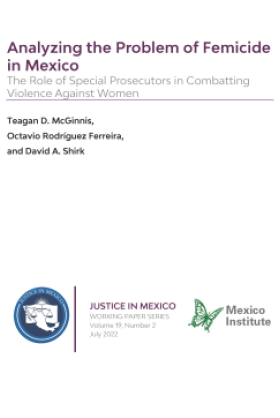Analyzing the Problem of Femicide in Mexico


Justice in Mexico has released its latest working paper titled Analyzing the Problem of Femicide in Mexico by Teagan McGinnis, Octavio Rodríguez Ferreira, and David Shirk. This study examines the patterns of violence against women in Mexico, with special attention to the problem of femicide. While national homicide data show that the proportion of female homicide victims in Mexico has stayed largely the same for decades, the authors demonstrate that the elevated rate of homicides throughout the country has contributed to a large increase in the total number of female homicide victims. Because many homicides targeting women have distinctive characteristics—such as sexual violence, intimate partners, or other factors attributable to the woman’s gender—they have been legally codified as “femicides,” murders targeting women due to their gender.
The authors explore the question of why both the number and proportion of femicides has increased dramatically since national level data became available in 2015. Since prosecutors play a key role in determining whether a crime will be classified as either a homicide or femicide, the authors specifically evaluate the effects of state level prosecutorial capacity on the reporting of such crimes. The authors compiled an original dataset of state prosecutorial budgets and levels of homicidal violence (by gender and by state) and used both means testing and linear regression models to assess differences between states with special prosecutors and those without, while controlling for the level of homicidal violence across states. In terms of qualitative methods, the authors also compiled federal and state laws to examine differences in criminal and administrative laws and conducted interviews with state prosecutors and security experts.
The authors find statistically significant evidence that states that have special prosecutors for the investigation of femicides are substantially more likely to classify female homicides as femicides. Indeed, appointing a special prosecutor for gender-related crimes increases the investigation of femicide cases by 50% on average, even controlling for levels of homicidal violence in those states. These findings illustrate the impact of recent prosecutorial reforms in Mexico and offer useful insights for policy makers and activists working to combat violence against women in Mexico. Informed by the novel findings in this study, the authors recommend that Mexican states lacking special prosecutorial offices for the investigation and prosecution of femicides should create such units, and that all states should provide more resources and prosecutorial tools for the investigation and prosecution of gender-motivated crimes.
Authors

Professor and Graduate Director, Department of Political Science and International Relations, University of San Diego; Director, "Justice in Mexico" Project

Mexico Institute
The Mexico Institute seeks to improve understanding, communication, and cooperation between Mexico and the United States by promoting original research, encouraging public discussion, and proposing policy options for enhancing the bilateral relationship. A binational Advisory Board, chaired by Luis Téllez and Earl Anthony Wayne, oversees the work of the Mexico Institute. Read more

Explore More
Browse Insights & Analysis
Engendering Safety: Addressing Femicide in Mexico

Securing a Digital Future for Women and Girls in MENA

Conflict in Sudan: Widespread Sexual Violence
